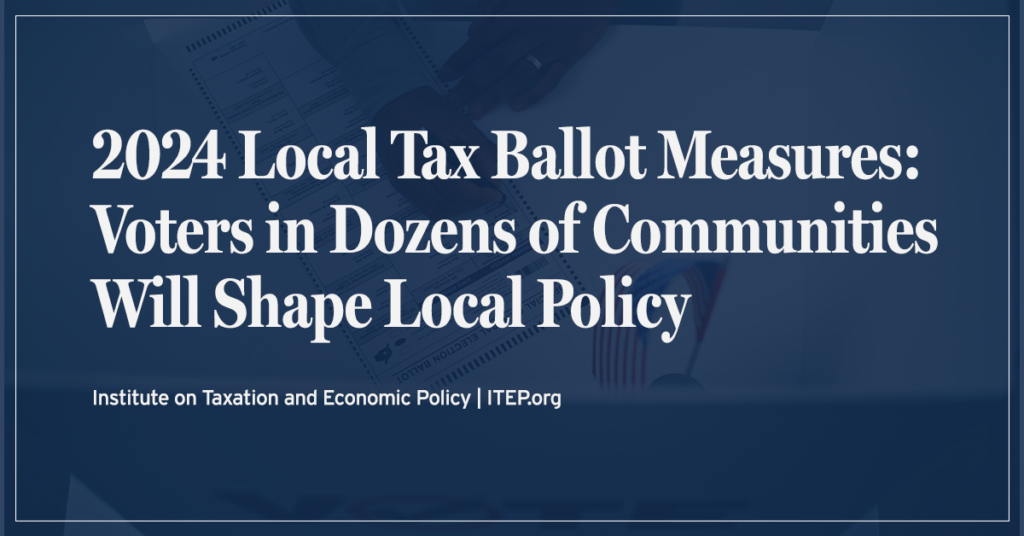While some enjoy candy, we know the readers of the Rundown prefer state tax policy updates for Halloween. Louisiana Gov. Jeff Landry is proposing a spooky and regressive tax reform package that would enact a flat personal and corporate income tax while expanding the state’s sales tax base and eliminating certain exemptions to make up for a portion of the lost revenue. The package is expected to cost the state $740 million a year by 2027 – more than the state’s impending fiscal cliff that the tax package was intended to solve.
Meanwhile, during special session, West Virginia continued to chip away at its personal income tax, one of the state’s few progressive revenue options. Scary! But if tricks aren’t your thing, we have treats this week, too. Advocates in New York are rallying around a package of progressive tax legislation that would tax capital gains at higher rates, enact higher income tax brackets on multi-millionaires, and tax unrealized capital gains of billionaires.
Major State Tax Proposals and Developments
- LOUISIANA Gov. Jeff Landry is still pushing for a special session on tax reform this November. His proposed tax reform package includes collapsing the state’s progressive personal income and corporate income tax brackets into flat rates of 3 percent and 3.5 percent, respectively. The plan would also increase the state’s standard deduction to $12,500 for single and $25,000 for married filers and fully eliminate the state’s corporate franchise tax. To pay for the tax cuts, Gov. Landry proposes renewing the state’s temporary .45 cent sales tax, expanding the sales tax base to services and digital goods, and eliminating sales tax exemptions and certain economic incentive programs like the film credit. The package is expected to cost $740 million a year by 2027. – NEVA BUTKUS
- WEST VIRGINIA legislators agreed to cut taxes during special session, reducing the state personal income tax by 2 percent and providing a non-refundable child and dependent tax credit for those who receive the federal credit. The cuts are expected to reduce revenue by $46 million and $4.2 million, respectively. A portion of the revenue used to fund the permanent cuts came from breaking up the former Department of Health and Human Services and spending cuts on foster care, Medicaid, and child care. The tax changes continue to chip away at the state’s most progressive revenue source and reduce state revenue, while doing little to address unaffordable child care. – ELI BYERLY-DUKE
State Roundup
- The DISTRICT OF COLUMBIA Tax Revision Commission delayed its final recommendations again due to an impasse over a proposed Business Activity Tax. Some observers are speculating that corporate interests who have the ear of some members of the commission are working to sabotage the process, and overall there is growing doubt that it will be able to produce final recommendations at all.
- GEORGIA Gov. Kemp and Republican leadership want to issue another round of rebates to Georgians. Single households would receive $250 while married households would receive $500. Rebates were also issued in 2022 and 2023.
- IOWA revenue projections show the state will be taking in over $1 billion less over the next two years due to the state’s new flat personal income tax.
- GOP leadership in KANSAS have stated their intent to eliminate the state’s corporate income tax, which brings in about $1.5 billion per year for shared priorities like schools, public safety, and health care.
- A set of proposals in MICHIGAN seek to provide eligible recipients a tax credit to lower the cost of child care, with focus on children zero to three and child care providers.
- A group of NEBRASKA lawmakers of varying political stripes have come together to craft and advocate for a bill to fix a mistake from the state’s whirlwind special session this summer: in the process of “frontloading” an existing property tax rebate so it directly reduces property taxes rather than retroactively refunding them, they inadvertently effectively eliminated the program altogether for one year.
- Raising the alcohol tax is expected to be a priority for NEW MEXICO lawmakers during the 2025 legislative session. Proposals to change the tax, which hasn’t happened since 1993, include increases to the rate and the establishment of alcohol harm alleviation funds.
- Advocates in NEW YORK are holding events and building support for a package of progressive tax proposals that includes: taxing capital gains at higher rates to offset the lower rates charged on such income federally, business tax reforms to raise billions from large corporations and pass-through entities, much higher top rates on the incomes of multi-millionaires, and an effort to apply taxes to the unrealized capital gains of billionaires.
What We’re Reading
- ITEP’s Rita Jefferson and Jon Whiten provide overviews of upcoming state and local ballot measures, summarizing where voters will soon be weighing in on tax policy at the polls.
- Governing digs into the last decade-plus of Nebraska politics and political spending to show how one egregiously wealthy family can unduly control politics in a small state. The piece explores how former Gov. Pete Ricketts and his billionaire family used their wealth to place an enormous thumb on races and campaigns up and down the ballot. In the 2022 election cycle, for example — which successfully yielded a win for the Ricketts’ preferred gubernatorial candidate Jim Pillen, who in turn appointed Pete Ricketts to the U.S. Senate — “Ricketts’ money made up more than 7 percent of all political giving to every political campaign and cause in Nebraska.”
If you like what you are seeing in the Rundown (or even if you don’t) please send any feedback or tips for future posts to Aidan Davis at [email protected]. Click here to sign up to receive the Rundown via email.





